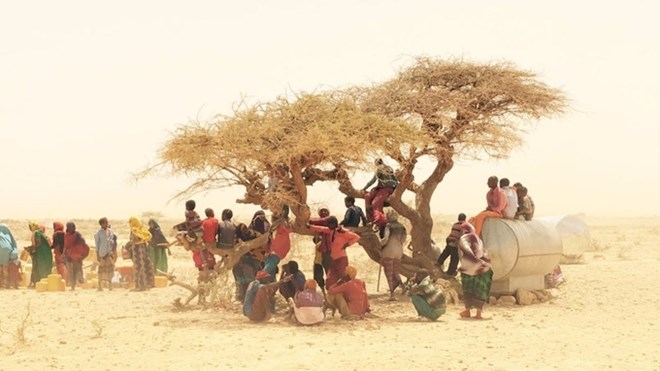
Tuesday August 8, 2017
By Rageh Omaar
 The once fertile lands have turned to dust after three years of no rain. Credit: ITV News
The once fertile lands have turned to dust after three years of no rain. Credit: ITV News
The drought that has gripped the self-declared Republic of Somaliland has been felt across the whole of the internationally unrecognised country.
But nowhere has it been more acute in the east of Somaliland in the Toogdhere, Soil & Sanaag regions.
Three years of failed rains and 90% of livestock lost in a country where 70% of the economy is dependent on the export of livestock.
The plight of Somaliland is just one part of a global struggle to avert famine.
Four countries are at risk - Somalia and Somaliland, Northern Nigeria, Yemen and South Sudan.
This has been my third trip to Somaliland this year, reporting on the effects of the crisis.
The UK has taken a lead on raising money and attention on what is happening across all of the countries affected by the threat of famine.
In particular, UK Aid - the humanitarian arm of the British government - has put considerable resources into Somalia.
Part of this aid goes to Somaliland - but this figure is not officially broken down so it's still very difficult to know how much of total UK aid for Somalia goes to alleviate the drought and humanitarian crisis there.
Until now, I have seen very little international aid, from the UK or anywhere else to be honest, getting through to the hardest hit areas in the east.
What I've seen on my previous visits have been from Gulf countries and donations by Somaliland businesses and the Somaliland diaspora in the West.
But that is now beginning to change.
After the enormous generosity of the UK public who responded to the DEC appeal earlier this year, some of that £53 million raised is now getting through to vulnerable communities in eastern Somaliland in the form of flour, water, cooking oil, sugar and dates.
And it's arrived just in time.
With the earth having been scorched dry by three years of failed rains - the barren earth that should be growing crops has been turned to dust.
Whilst I was there, displaced families began to gather as the UK charity, ActionAid delivered water by truck.
As we waited a huge dust storm lashed those waiting - as the fertile soil that these communities once farmed to feed themselves, but which was now turned into sand - was blown into their eyes.
Ahmed Adam Mohamed, head of operations for ActionAid's UK branch, told me the aid has kept many alive - but there’s still a long way to go, saying the crisis was very far from being over.
Asha Haji Farah’s family is one of five hundred in a settlement for displaced people. They get 25 kilos of supplies every month.
The reality however is that it doesn’t just feed them.
There are others arriving all the time so the supplies she carries to her home meant for them are in reality shared with several other families.
It's the same for everyone here.
"My message to people in Britain is; thanks to you this food has helped us so much," she said.
"But still there are many who are in need - we need your help.”
The assistance - bought with British public donations and now beginning to be delivered in these remote regions of Somaliland is a lifeline that arrived just in time to avert famine.
But it doesn’t mean that that threat has has gone - and people are still dying from diseases associated with malnutrition.
If the rains fail again in the coming months - millions more will be at risk and in need of more assistance that only this kind of lifeline can give.
Donate to the DEC East Africa Appeal here
Find out more from Action Aid here